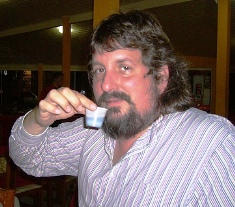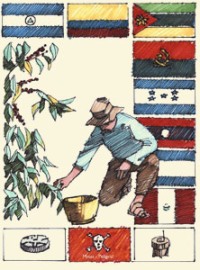| Coffee Casualties: Landmines in Coffeelands James Hayes-Bohanan , Ph.D. Coffee Maven and Geographer Bridgewater State University UPDATED November 6, 2010 |
 |
|
I have
expanded this site's information about coffee shops, coffee roasters,
coffee tours, health effects,
and coffee preparation, and have moved that information to other pages. Please explore! |
|
| I had led two study tours to
Nicaragua -- during which we discussed the
revolutionary and post-revolutionary history that took place in its
coffeelands -- before I recognized the importance of landmines. Since
then, I have learned that almost 200,000 landmines have been removed
from Nicaragua, but not before more than 1,000 of its people were
killed. Since I was made aware of the special problems of landmines in
coffee-growing communities throughout the world by the Coffeeland
Landmine Victims Trust, this has become a growing part of my work. The Coffeeland Landmine Victims Trust was established by the Polus Center for Social and Economic Development, which works throughout the world to help people with physical disabilities to develop their own capacity for rehabilitation. Its executive director, Michael Lundquist, is a graduate of Bridgewater State University and a friend to our current students. He has helped me to make direct connections between my students and the community of landmine victims that are undertaking their own community development in Nicaragua. |
 |
In addition to the articles on the Coffeelands Trust web site, I have begun to identify information about coffeelands and landmines from other sources.
Rehabilitating coffee in Angola is an overview from New Agriculturalist, which references Rehabilitating the coffee sector in Angola the full research paper by George Odour, CAB International. This is a challenging article for me. It describes in detail what would be needed to restore the once-thriving coffee sector of Angola to what it was prior to the periods of war that began in 1974. The sector in those days, however, was one in which small farmers were at a distinct disadvantage in the market place. As attention turns to restoring coffee production in Angola, perhaps a way can be found to create a new system that is better than the original.